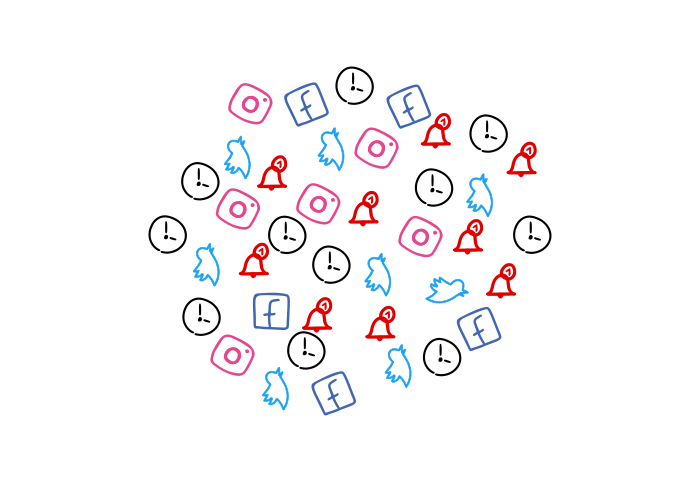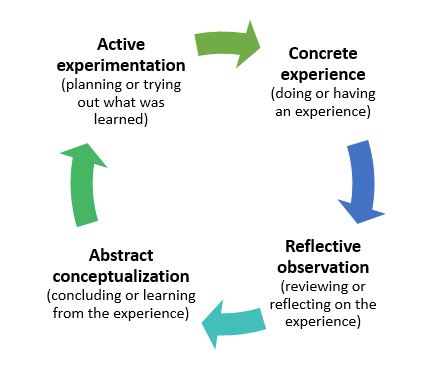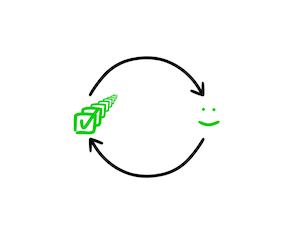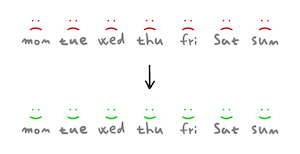The allure of interesting content: a double-edged sword in the digital age

The internet is an endless stream of interesting content: in-depth podcasts, instructional videos, captivating Instagram reels and so on.
Here's the problem:
The more interesting a piece of content is, the easier it is to justify it as "learning", when in fact it's just an excuse to get distracted.
Information ≠ learning
A thought-provoking podcast can be transformational, that's true. But 99% of the time, it isn't, because it's only one step in the process of learning, and by far not the most important one.
To help you understand this, here's a model for how we actually learn:

This is how we change the structures of our brain to get better at something.
You can simplify the model even further into an interplay between 2 elements:
- Theory (abstract conceptualization, reflective observation)
- Practice (active experimentation, concrete experience)
The Internet is full of theory, but putting it into practice is rare. As Derek Sivers put it:
"If information was the answer, we'd all be billionaires with perfect abs."
This is not learning:
- See an Instagram reel about stretching/mobility training
- Save the reel
- The end.
Yet, that's what happens far too often. We forget the information heard or read within a couple of days, unless we do something with it.
In fact, the supposedly valuable information can be counter-productive.
We're drowning in interesting, insightful, or educational content
But the thing is, drowning is still drowning, no matter the substance.
While the intention of much content is to help people, the result is often being unhelpful.
Here's 5 ways to improve your cooking:
Here's 10 exercises you should do every day:
Here's 3 behaviors you should avoid:
...
Too. Many. Choices.
Instead of feeling inspired, we can come away intimidated, overwhelmed, and feeling lesser than others.
If you've felt like that before, here's what to do about it.
Pair content with practice context, or it's another distraction
Be really clear about this to yourself:Unless you put into practice the supposedly helpful content, you're not learning; you're distracting yourself.
Now, there's some nuance to this. We could simply say: don't consume any content, go out there and live. But that is far easier said and done, especially if the distraction-related pathways in our brain are strengthened through years of compulsive behavior repetition.
That said, if you are interested in quitting content cold-turkey altogether, check out this post about doing a dopamine detox.
However, if you don't feel like you're ready to take that leap of faith, we have some simple, but not necessarily easy things to do to put this post (information) into practice (experience).
1. Pick non-disruptive time windows to consume content in
When we choose to consume content can have a great impact on how it affects us.
Let's get some examples of good and bad times to scroll, watch videos, or listen to podcasts.
Good times:
- Transit
Usually, when we're on a bus, train, or tram, there isn't much space to do real work. There are people moving, you need to pay attention to stops, there isn't enough space for a laptop etc. In that case, podcasts or audiobooks can be a good way to absorb potentially useful information. - During a non-intensive workout
During an intensive workout, you're better off focusing on the movement you're doing, but if you have a simple exercise routine that you do every day, consuming a little bit of content might not be a bad idea. - During chores
Chores (whether household or work-related) are potentially good times to listen to podcasts or audiobooks, provided you don't need to do anything related to language use. If you do, content begins to interfere with your ability to form sentences and express ideas.
Which brings up to some bad times to engage in content consumption:
- When you have enough energy to do work
You have your cup of coffee, you sit down at your computer. What do you do? Hopefully, the answer is not to check social media or YouTube. If you start the day by consuming content, it becomes hard to start producing, well, anything. - After a work session (but before your work is done for the day)
You've done some work, and you feel good about it. Let's take a break. And you do a bit of scrolling, and soon an hour is gone, and with it the positive feelings about work done, replaced by the negative feeling about the hour you just wasted. That's a prime example of a bad break. If you must scroll, leave it for after you're done with work. Content consumption is antithetical to focus. - Late at night when you should be winding down for sleep
Some people find falling asleep listening to a podcast or an audiobook useful for quieting down the chatter of the mind. If that's the case for you, that might not be such a bad idea. However, if you stare at a screen for 2 hours before you finally decide to pass out, that's not so good anymore. If the way you consume content is helping you sleep, super, if it's delaying it, stop.
Consuming information can improve your day or disrupt it in a major way. Choose the time window wisely.
Need to listen to something? Ambient noise and music are your friends
One thing to note: you might have developed a habit of always listening to something while you work. That's okay, but like we said above, any language-related task will be negatively affected by listening to spoken word in the background.
Fortunately, there are alternatives:
- Brown noise
- Ambient noise (example of Japanese garden sounds)
- Ambient music (Weightless by Marconi Union)
- Classical music / soundtracks
Ambient sounds and music improve your focus, instead of detracting from it. Try those when you feel like you need to listen to something.
2. Find 1 thing to do from every content session
What if you just spent 30 minutes scrolling Instagram or Twitter. That's fine. Your life isn't over. If you did it just to be entertained, all good; hopefully, you don't regret having spent your time doing that.
But if you did it with the intent to learn from cool and interesting accounts, then what's something you can actually use from your scrolling session?
Maybe you watched and saved a cool dance video?
Could you spend 5 minutes trying that move?
Maybe you saw a fun way to spice up your cooking?
Try it out in your next meal.
Cool breathing technique for managing low-level anxiety?
Stop scrolling and give it a try.
...
Again, the aim is to turn information into experience, and start the process of changing your daily life, bit by bit.
Ask yourself: What's something I can apply? after you finish scrolling.
3. Create a context to apply information in
Note: this takes some effort, but perhaps not as much as you might think.
If you want to actually benefit from the information you consume, create a space to apply that information in.
Example, you see a lot of videos about working out, lifting weights, and mobility training.
Great, you know it's good for you, but you don't have a workout routine.
Unless you have a part of your day where you can apply that information, your time spent consuming it is wasted.
With the example of exercise, it would be a great idea to brush the dust off your yoga mat, roll it out, and try something. You don't need to do every exercise in every list. Something >>>> nothing.
Who do you follow that provides practical information? What context is that information for? The gym? The kitchen? Your workplace?
Consume that content when you're in the relevant context, or save it in a way that allows you to easily look it up when you're in that context.
Summary
Okay, let's wrap this up.
Here are the key points:
- Consuming content willy-nilly does not lead to learning, it's becomes a waste of time
- Interesting content can lead to feeling overwhelmed rather than inspired
To derive any benefits from content:
- Pick non-disruptive time windows to consume content in
- Look for at least one actionable takeaway from each content session (ideally apply right after you consume it)
- Create a context or space to apply the information you've learned
In what context is a piece of content relevant? Is that context a part of your routine or would you need to create it? How can you consume that information at the right time to maximize your chances of applying it?
And importantly, the less time you spend watching something, the more time you'll have to apply what you already know and do what you know you need to do.
Interesting content can be a trap, don't fall for it.
So, how will you use this information?


